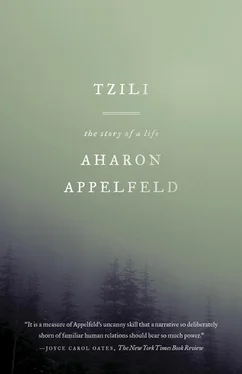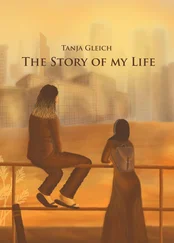And when morning broke the river was smooth and placid. A greenish-blue light shone on its surface. No one spoke. They spread their clothes out to dry and the old moldy smell, which seemed to have gone away, rose once more into the air.
Afterward they lit a fire and sat down to eat. Their hunger was voracious. The loaves of bread disappeared one after the other.
Tzili forgot herself for a moment. Zigi’s athletic run went on flashing past her eyes, with great rapidity. It seemed to her that he would soon rise from the river, shake the water off his body, and announce: “The river’s fine for swimming.”
In the afternoon the place suddenly seemed confined and threatening, the light oppressive. The peasant women came and spread their wares on their flowered cloths, but no one bought anything. The women sat and looked at them with watchful eyes. One of them asked: “Why aren’t you buying today? We have bread and smoked meat. Fresh milk too.”
“Let’s go,” someone said, and immediately they all stood up. Tzili too raised her heavy body from the ground. No one asked: “Where to?” A dumb wonder stared from their faces, as after enduring grief. Tzili was glad that the haversack was empty, and now she had nothing but her own body to carry.
THEY WALKED ALONG the riverside, toward the south. The sun shone on the green fields. Now it seemed that Zigi Baum was floating on the current, his arms outspread. Every now and then his image was reflected on the surface of the water. No one stopped to gaze at this shining reflection. The current widened as it approached the dam, a mighty torrent of water.
Later on a few people turned off to the right. They turned off together, without asking any questions or saying good-bye. Tzili watched them walk away. They showed no signs of anger or of happiness. They went on walking at the same pace — for some reason, in another direction.
Tzili, it appeared, was already in the sixth month of her pregnancy. Her belly was taut and heavy but her legs, despite the difficulties of the road, walked without stumbling. When the refugees stopped to rest, they ate in silence. The strange disappearance of Zigi Baum had infected them with a subtle terror, unlike anything they had experienced before.
Tzili was happy. Not a happiness which had any outward manifestations: the fetus stirring inside her gave her an appetite and a lust for life. Not so the others: death clung even to their clothes. They tried to shake it off by walking.
From time to time they quickened their pace and Tzili fell behind. They were as absorbed in themselves now as they had been before in their card game. No one asked: “Where is she?” but nevertheless Tzili felt that their closeness to her was stronger than their distraction.
She no longer thought much about Mark. As if he had set out on a long journey from which it would take a long time to return. He appeared to her now as a tiny figure on the distant horizon, beyond the reach of her voice. She still loved him, but with a different kind of love. A love which had no real taste. From time to time a kind of awe descended on her and she knew: it was Mark, watching her — not uncritically — from afar.
She would say: Mark is inside me, but she didn’t really feel it. The fetus was now hers, a secret which no one but she could touch.
Once, when they had stopped to rest, a woman asked her: “Isn’t it hard for you?”
“No,” said Tzili simply.
“And do you want the baby?”
“Yes.”
The woman was surprised by Tzili’s reply. She looked at her as if she were some stupid, senseless creature. Then she was sorry and her expression changed to one of wonder and pity: “How will you bring it up?”
“I’ll keep it with me all the time,” said Tzili simply.
Tzili too wanted to ask: “Where are you from?” But she had learned not to ask. On their last halt a quarrel had broken out between two women as a result of a tactless question. People were very tense and questions brought their repressed anger seething to the surface.
“How old are you?” asked the woman.
“Fifteen.”
“So young.” Wonder softened the woman’s face.
Tzili offered her a piece of bread and she said, “Thank you.”
“I,” said the woman, “have lost my children. It seems to me that I did everything I could, but they were lost anyway. The oldest was nine and the youngest seven. And I am alive, as you see, even eating. Me they didn’t harm. I must be made of iron.”
A pain shot through Tzili’s diaphragm and she closed her eyes.
“Don’t you feel well?” asked the woman.
“It’ll pass,” said Tzili.
“Give me your mug and I’ll fetch you some water.”
When the woman returned Tzili was already sitting calmly on the ground. The woman raised the cup to Tzili’s mouth and Tzili drank. The woman now wanted more than anything to help Tzili, but she did not know how. Tzili, in spite of everything, had more food than she did.
Straight after this night fell and the woman sank to the ground and slept. She shrank to the size of a child of six. Tzili wanted to cover the woman with her tattered coat, but she immediately suppressed this impulse. She did not want to frighten her.
The others were awake but passive. The isolated words which fluttered in the air were as inward as a conversation between two lovers, no longer young.
The night was warm and fine and Tzili remembered the little yard at home, where she had spent so many hours. Every now and then her mother would call, “Tzili,” and Tzili would reply, “Here I am.” Of her entire childhood, only this was left. All the rest was shrouded in a heavy mist. She was seized by longing for the little yard. As if it were the misty edge of the Garden of Eden.
“I have to eat.” She banished the vision and immediately put her hand into the haversack and tore off a piece of bread. The bread was dry. A few grains of coal were embedded in its bottom crust. She liked the taste of the bread. Afterward she ate a little smoked meat. With every bite she felt her hunger dulled.
THE SUMMER TOOK them by surprise, hot and broad, filling them with a will to live. The paths all flowed together into green creeks, bordered by tall trees. Refugees streamed from all directions, and for some reason the sight recalled summer holidays, youth movements, seasonal vacations, all kinds of forgotten youthful pleasures. Words from the old lexicon floated in the air. Only their clothes, like an eternal disgrace, went on steaming.
Tzili sat still, this happiness made her anxious. Soon it would give way to screams, pain, and despair.
That night they made a fire, sang and danced, and drank. And as after every catastrophe: embraces, couplings, and despondency in their wake. Tall women with the traces of an old elegance still clinging to them lay sunbathing shamelessly next to the lake.
“What does it matter — there’s no point in living anymore anyway,” a woman who had apparently run wild all night confessed. She was strong and healthy, fit to bring many more children into the world.
“And you won’t go to Palestine?” asked her friend.
“No,” said the woman decisively.
“Why not?”
“I want to go to hell.”
From this conversation Tzili absorbed the word Palestine . Once when her sister Yetty had become involved with the Moravian officer, there had been talk of sending her to Palestine. At first Yetty had refused, but then she changed her mind and wanted to go. But by then they didn’t have the money to send her. Now Tzili thought often of her sister Yetty. Where was she now?
Tzili’s fears were not in vain. The calamities came thick and fast: one woman threw herself into the lake and another swallowed poison. The marvelous oblivion was gone in an instant and the same healthy woman, the one who had refused to go to Palestine, announced: “Death will follow us all our lives, wherever we go. There’ll be no more peace for us.”
Читать дальше












